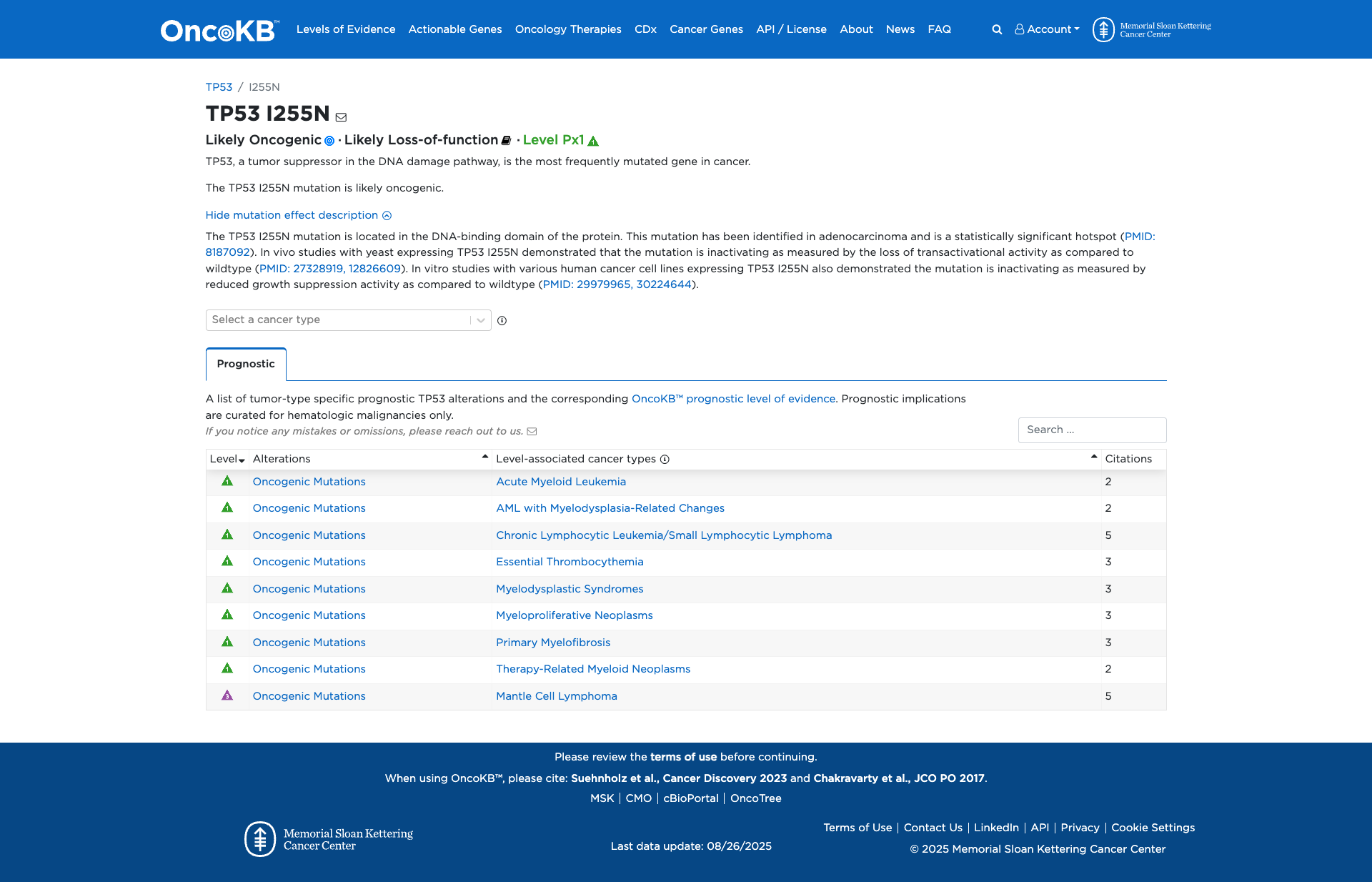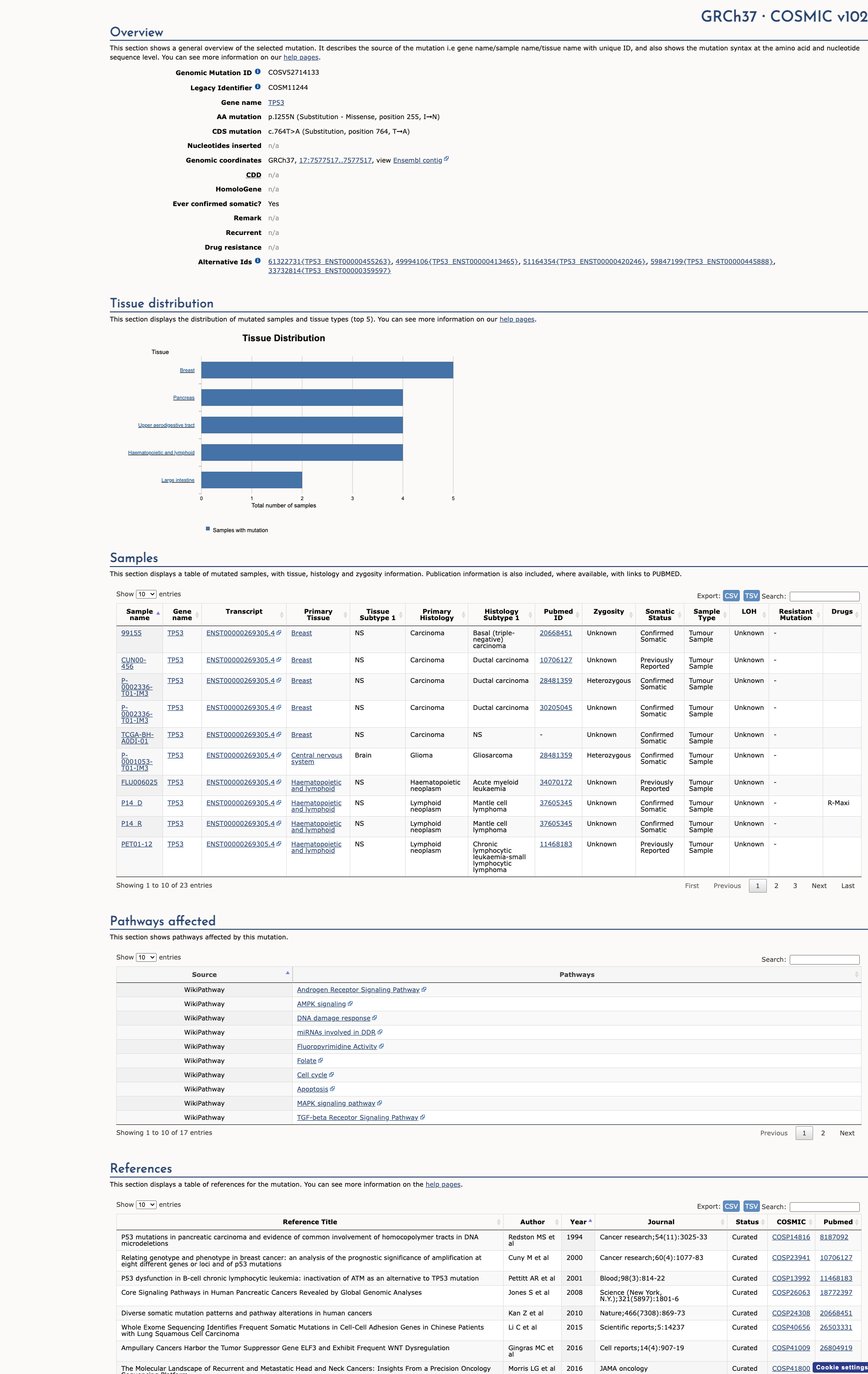TP53 c.764T>A, p.Ile255Asn
NM_000546.5:c.764T>A
COSMIC ID: COSM11244, COSM437491
Pathogenic
This TP53 I255N missense variant is absent from population databases (PM2_Supporting) but lacks other supportive evidence under VCEP specifications. With only a single supporting criterion, the variant is classified as VUS.
ACMG/AMP Criteria Applied
PM2
Genetic Information
Gene & Transcript Details
Gene
TP53
Transcript
NM_000546.6
MANE Select
Total Exons
11
Strand
Reverse (−)
Reference Sequence
NC_000017.10
Alternative Transcripts
| ID | Status | Details |
|---|---|---|
| NM_000546.5 | RefSeq Select | 11 exons | Reverse |
| NM_000546.3 | Alternative | 11 exons | Reverse |
| NM_000546.4 | Alternative | 11 exons | Reverse |
| NM_000546.2 | Alternative | 11 exons | Reverse |
Variant Details
HGVS Notation
NM_000546.5:c.764T>A
Protein Change
I255N
Location
Exon 7
(Exon 7 of 11)
5'Exon Structure (11 total)3'
Functional Consequence
Loss of Function
Related Variants
No evidence of other pathogenic variants at position 255 in gene TP53
Alternate Identifiers
COSM11244, COSM437491
Variant interpretation based on transcript NM_000546.6
Genome Browser
Loading genome browser...
HGVS InputNM_000546:c.764T>A
Active Tracks
ConservationRefSeqClinVargnomAD
Navigation tips: Use mouse to drag and zoom. Click on features for details.
Clinical Data
Population Frequency
Global Frequency
0.0 in 100,000
Extremely Rare
Global: 0.0%
0%
0.05%
0.1%
1%
5%
10%+
ACMG Criteria Applied
PM2
This variant is not present in gnomAD (PM2 criteria applies).
Classification
2 publications
Likely Pathogenic
Based on 6 submitter reviews in ClinVar
Submitter Breakdown
1 Path
2 LP
3 VUS
Pathogenic
Likely Path.
VUS
Likely Benign
Benign
Publications (2)
This variant is not present in population databases (gnomAD no frequency). This sequence change replaces isoleucine, which is neutral and non-polar, with asparagine, which is neutral and polar, at codon 255 of the TP53 protein (p.Ile255Asn). This variant has not been reported in the literature in individuals affected with TP53-related conditions. In summary, the available evidence is currently insufficient to determine the role of this variant in disease. Therefore, it has been classified as a Variant of Uncertain Significance. This variant disrupts the p.Ile255 amino acid residue in TP53. Other variant(s) that disrupt this residue have been determined to be pathogenic (Invitae). This suggests that this residue is clinically significant, and that variants that disrupt this residue are likely to be disease-causing. Experimental studies have shown that this missense change affects TP53 function (PMID: 12826609, 29979965, 30224644). Advanced modeling performed at Invitae incorporating data from internal and/or published experimental studies (PMID: 12826609, 29979965, 30224644) indicates that this missense variant is expected to disrupt TP53 function. ClinVar contains an entry for this variant (Variation ID: 232289).
This variant is considered likely pathogenic. Functional studies indicate this variant impacts protein function [PMID: 29979965]. This variant is expected to disrupt protein structure [Myriad internal data].
Clinical Statement
This variant has been reported in ClinVar as Pathogenic (1 clinical laboratories) and as Uncertain significance (3 clinical laboratories) and as Likely pathogenic (2 clinical laboratories).
COSMIC ID
COSM11244, COSM437491
Recurrence
23 occurrences
PM1 Criteria
Applied
Criterion PM1 is applied based on the high recurrence in COSMIC database.
COSMIC Database Preview
Accessing full COSMIC database details requires institutional login or subscription. External links may prompt for authentication.
Functional Impact
Functional Domain
Hotspot Status
Hotspot
PM1
Mutation Count
160
Reported mutations in this domain
050100+
Domain Summary
This variant is located in a mutational hotspot or critical domain (160 mutations).
PM1 criterion applied.
Related Variants in This Domain
No evidence of other pathogenic variants at position 255 in gene TP53
Functional Summary
The TP53 I255N variant has been functionally characterized and demonstrated to have a damaging effect. In vivo studies in yeast and in vitro studies in human cancer cell lines have shown that the TP53 I255N mutation is inactivating, resulting in a loss of transactivational activity and reduced growth suppression activity compared to the wildtype protein.
Database Previews
OncoKB

JAX-CKB

Click on previews to view full database entries. External databases may require institutional access.
Computational Analysis
Pathogenicity Predictions
REVEL Score
0.928
0.928
Likely Benign0.0
Uncertain (Low)0.2
Uncertain (Med)0.5
Likely Pathogenic0.75
REVEL scores ≥ 0.75 are strong evidence (PP3)
Predictor Consensus
Mixed/VUS
PP3 Applied
Yes
Additional Predictors
Pathogenic:
polyphen_prediction: probably_damagingmetasvm: Dmetalr: D
Benign:
CADD: 4.81primateai: T
Neutral: Show all
VCEP Guidelines
Applied ACMG/AMP Criteria (VCEP Specific) VCEP Guidelines
PVS1
PVS1 (Not Applied) Strength Modified
According to VCEP guidelines, PVS1 applies to null variants (nonsense, frameshift, canonical ±1,2 splice, initiation codon) predicted to undergo NMD or disrupt critical domains. The evidence for this variant shows it is a missense change (I255N). Therefore, this criterion is not applied.
PS1
PS1 (Not Applied) Strength Modified
According to VCEP guidelines, PS1 applies when a variant results in the same amino acid change as a previously established pathogenic variant. No identical amino acid change at codon 255 has been reported as pathogenic. Therefore, this criterion is not applied.
PS2
PS2 (Not Applied) Strength Modified
According to VCEP guidelines, PS2 requires de novo occurrence with parental confirmation (points based). No parental testing or de novo data are available. Therefore, this criterion is not applied.
PS3
PS3 (Not Applied) Strength Modified
According to VCEP guidelines, PS3_Strong requires non‐functional on Kato et al. data AND loss of function on another assay. No Kato or Giacomelli/Kotler assay data are available for this variant. Therefore, this criterion is not applied.
PS4
PS4 (Not Applied) Strength Modified
According to VCEP guidelines, PS4 requires proband case‐control or proband point scoring (≥1 point for Supporting). No case‐control data or proband points are available. Therefore, this criterion is not applied.
PM1
PM1 (Not Applied) Strength Modified
According to VCEP guidelines, PM1_Moderate applies to missense variants within codons 175, 245, 248, 249, 273, or 282. Codon 255 is outside these hotspot positions, and there are 0 occurrences in cancerhotspots.org. Therefore, this criterion is not applied.
PM2
PM2 (Supporting) Strength Modified
According to VCEP guidelines, PM2_Supporting: "allele frequency <0.00003 in gnomAD or another large population database." The evidence for this variant shows it is absent from gnomAD (MAF = 0). Therefore, this criterion is applied at Supporting strength.
PM3
PM3 (Not Applied) Strength Modified
According to standard ACMG guidelines, PM3 applies to recessive disorders with variants in trans. TP53 is associated with dominant inheritance and no trans data are applicable. Therefore, this criterion is not applied.
PM4
PM4 (Not Applied) Strength Modified
According to standard ACMG guidelines, PM4 applies to protein length changes (in‐frame indels). This variant is missense with no length change. Therefore, this criterion is not applied.
PM5
PM5 (Not Applied) Strength Modified
According to VCEP guidelines, PM5 applies when ≥1 other TP53 missense variant at the same residue has been classified as pathogenic (Moderate) or ≥2 as pathogenic (Strong). No other pathogenic substitutions at codon 255 are reported. Therefore, this criterion is not applied.
PM6
PM6 (Not Applied) Strength Modified
According to standard ACMG guidelines, PM6 applies to assumed de novo without parental confirmation. No de novo data are available. Therefore, this criterion is not applied.
PP1
PP1 (Not Applied) Strength Modified
According to VCEP guidelines, PP1 requires segregation in families (≥3 meioses for Supporting). No segregation data are available. Therefore, this criterion is not applied.
PP2
PP2 (Not Applied) Strength Modified
According to standard ACMG guidelines, PP2 applies when missense variants are a common mechanism of disease and the gene has low benign missense variation. TP53 does not meet these generic PP2 conditions per VCEP absence of PP2. Therefore, this criterion is not applied.
PP3
PP3 (Not Applied) Strength Modified
According to VCEP guidelines, PP3 requires specific computational evidence (aGVGD C65 AND BayesDel ≥0.16 for Moderate; BayesDel ≥0.16 for Supporting). No aGVGD or BayesDel scores are provided. Therefore, this criterion is not applied.
PP4
PP4 (Not Applied) Strength Modified
According to VCEP guidelines, PP4 applies to VAF observations in tumor sequencing. No tumor VAF data are available. Therefore, this criterion is not applied.
PP5
PP5 (Not Applied) Strength Modified
According to standard ACMG guidelines, PP5 (reputable source) is discouraged and not incorporated into VCEP. Therefore, this criterion is not applied.
BA1
BA1 (Not Applied) Strength Modified
According to VCEP guidelines, BA1 applies if allele frequency ≥0.001 in any gnomAD subpopulation. The variant is absent (AF = 0). Therefore, this criterion is not applied.
BS1
BS1 (Not Applied) Strength Modified
According to VCEP guidelines, BS1 applies if allele frequency ≥0.0003 but <0.001 in gnomAD. The variant is absent. Therefore, this criterion is not applied.
BS2
BS2 (Not Applied) Strength Modified
According to VCEP guidelines, BS2 requires observation of ≥2 unrelated older females without cancer. No such data are available. Therefore, this criterion is not applied.
BS3
BS3 (Not Applied) Strength Modified
According to VCEP guidelines, BS3 requires functional evidence of normal protein function on Kato et al. data AND no LOF on another assay. Functional studies show loss of function. Therefore, this criterion is not applied.
BS4
BS4 (Not Applied) Strength Modified
According to VCEP guidelines, BS4 requires lack of segregation in affected family members. No segregation data are available. Therefore, this criterion is not applied.
BP1
BP1 (Not Applied) Strength Modified
According to standard ACMG guidelines, BP1 applies to missense in genes where only truncating variants cause disease. TP53 disease is caused by missense hotspots. Therefore, this criterion is not applied.
BP2
BP2 (Not Applied) Strength Modified
According to standard ACMG guidelines, BP2 applies to observed in trans with a dominant variant or cis with pathogenic variant. No such observations are reported. Therefore, this criterion is not applied.
BP3
BP3 (Not Applied) Strength Modified
According to standard ACMG guidelines, BP3 applies to in‐frame indels in repetitive regions. Not applicable to a missense variant. Therefore, this criterion is not applied.
BP4
BP4 (Not Applied) Strength Modified
According to VCEP guidelines, BP4 requires BayesDel ≤–0.008 AND SpliceAI <0.2 for moderate or BayesDel <0.16 AND SpliceAI <0.2 for supporting. No BayesDel or SpliceAI scores are provided. Therefore, this criterion is not applied.
BP5
BP5 (Not Applied) Strength Modified
According to standard ACMG guidelines, BP5 applies if variant found in a case with an alternate molecular basis for disease. No such data are available. Therefore, this criterion is not applied.
BP6
BP6 (Not Applied) Strength Modified
According to standard ACMG guidelines, BP6 applies to assertions of benign from reputable sources without evidence. Not used under VCEP. Therefore, this criterion is not applied.
BP7
BP7 (Not Applied) Strength Modified
According to VCEP guidelines, BP7 applies to silent or intronic variants with no splicing impact. This is a missense variant. Therefore, this criterion is not applied.

